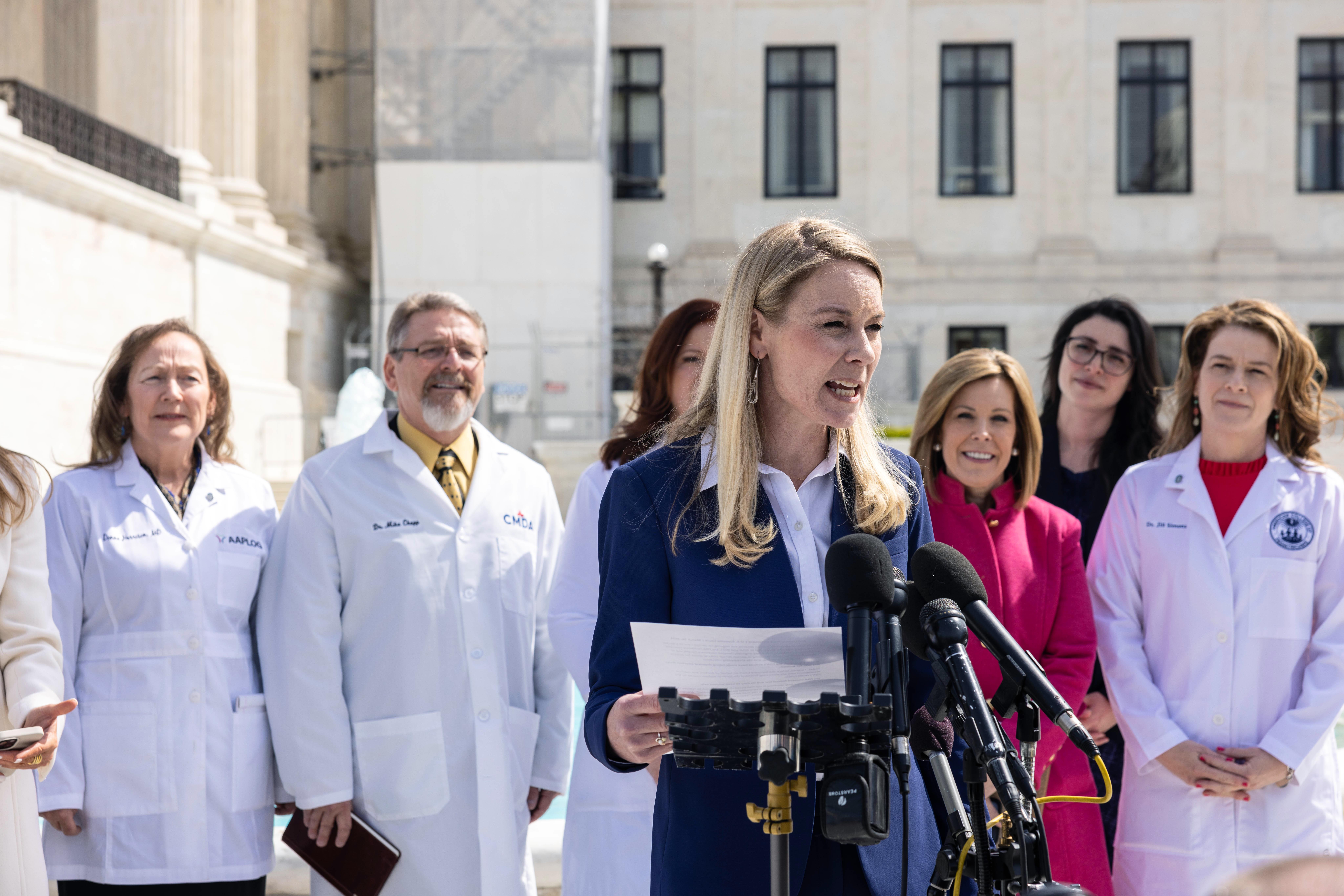In 2022, when the Supreme Court decided Dobbs v. Jackson Women’s Health Organization and rescinded the constitutional right to end a pregnancy, the five justices in the majority insisted that they were getting the Court out of the reproductive rights business. “The authority to regulate abortion must be returned to the people and their elected representatives,” wrote Justice Samuel Alito. The majority claimed that the Court should never have recognized a right to abortion in the first place—and that, by rescinding it, they were putting an end to an abuse of judicial power.
But in fact, they were just getting started. Two years later, abortion is back at the Supreme Court, and a couple justices are already itching to go beyond Dobbs and further limit reproductive healthcare nationwide.
The Supreme Court heard oral argument on Tuesday morning in Food and Drug Administration v. Alliance for Hippocratic Medicine. The case was brought by a loose association of anti-abortion doctors who allege that they could be harmed by the FDA’s decades-old approval of mifepristone—a pill used in almost two-thirds of abortions—and by more recent policy decisions the agency made to make mifepristone more accessible.
The members of the AHM, which sprung into existence six weeks after Dobbs, do not prescribe mifepristone. Rather, they contend that it would offend their consciences if a patient experienced complications from mifepristone that was prescribed by another doctor, and needed a doctor to remove tissue from their uterus, and AHM doctors were the only doctors around who could provide the necessary medical care.

A member of the Hawley family and right-wing activists near the U.S. Capitol, under considerably less fraught circumstances than the last time this happened (Photo by Anna Rose Layden/Getty Images)
The group’s proposed remedy to their potential predicament is to prevent anyone from accessing mifepristone. Like the losers who ask, “If I were the last man on Earth, then could I go out with you?”, these medical professionals are asking, “If I were the last doctor on Earth, then could I force you to give birth?”
The major problems with the doctors’ argument are, first, it doesn’t make any damn sense, and second, doctors don’t have a legal right to compel a patient’s pregnancy just because the termination of pregnancy gives them a case of the sads. Mercifully, most of the justices recognized that these hurdles are simply too high for anti-abortion activists to clear, this time. Justice Ketanji Brown Jackson emphasized the sheer breadth and scale of what the AHM was asking for, and indicated that she was struggling to “understand how they could possibly be entitled to that given the injury that they have alleged.” And Justice Amy Coney Barrett seemed unable to get around the case’s shaky factual ground, observing that although the doctors objected to the possibility of violating their conscience by performing an abortion, they presented no evidence showing “that they ever participated in that” in reality.
Justice Neil Gorsuch also suggested that his compatriots in the conservative legal movement were doing too much with too little. “This case seems like a prime example of turning a small lawsuit into a nationwide legislative assembly,” he said. When your case is too imaginary even for Gorsuch, whose fondness for the crocodile tears of manufactured plaintiffs is a matter of public record, you’ve really lost the plot.
Like the membership of this Court, FDA v. Alliance for Hippocratic Medicine is a sloppy, hastily-manufactured bid by the conservative legal movement to drive the Republican policy agenda. But even if it doesn’t succeed, it may still move the needle towards greater injustice, as the cases that chipped away at Roe did. Alarmingly, Alito and Justice Clarence Thomas both asked the advocates about the Comstock Act—a 19th-century federal statute, unenforced for decades, that prohibits anything “obscene” from being sent through the mail for any “indecent or immoral purpose.” The law refers to anything that could be used to produce abortion as unmailable, and many Republican politicians are now arguing that this “zombie law” could be reanimated and used to ban abortion nationwide without any new legislation.
Both the conservative activist lawyers arguing the case and conservative activist lawyers deciding it used oral argument to surface this line of reasoning. Alito described Comstock as “prominent provision” and “not some obscure subsection of a complicated obscure law”; in an exchange with a lawyer for a pharmaceutical company that manufactures mifepristone, Thomas characterized the law as “fairly broad, and it specifically covers drugs such as yours.” Erin Hawley, AHM’s lawyer and spouse of the other shitty Hawley in politics, gestured towards Comstock’s potential utility to the conservative legal movement by telling Thomas that the law’s plain text “is pretty clear.”
Republicans on the Court use cases like FDA v. Alliance for Hippocratic Medicine to tee up the conservative legal movement for future success. They may lose this battle, but Thomas and Alito are giving far-right activists like Hawley their marching orders for the next one.




